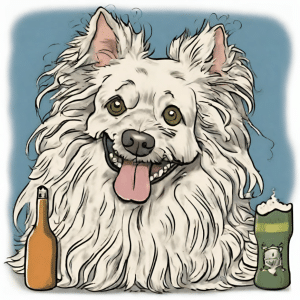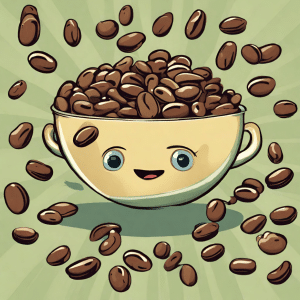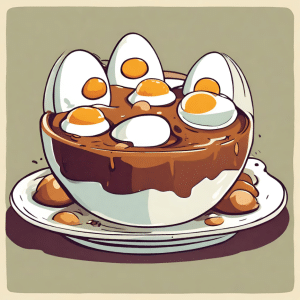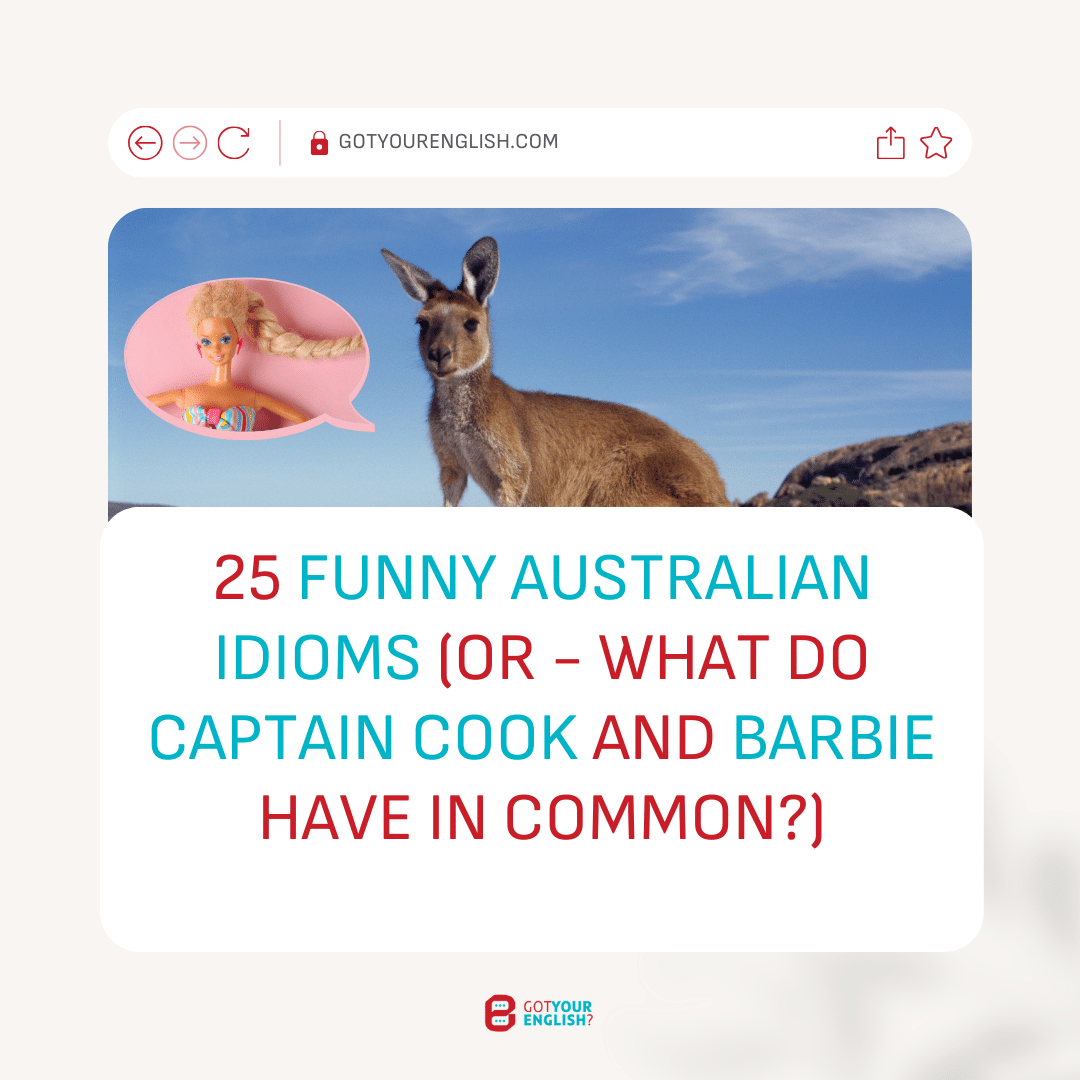
(Audio version of this post, audio has been generated from the text.)
40+ Funny British Idioms (to Speak English Like a Native)!
When you want to blend in with the Brits, using funny British idioms and phrases will get you noticed.
To help you sound more like a native English speaker, we’ve prepared a list of the funniest British idiomatic expressions for you. Many of these are unknown to most English students!
P.S.: If you would like to expand your vocabulary even further with more universal and humorous English idioms, head on over to our previous blog post – 16 Hilarious (And Weird) English Idioms You Didn’t Know.
37 (+ 7) Funny Idioms and Phrases in British English
- What’s that got to do with the price of (fish/tea in China)? – This one is especially funny because you can substitute fish with almost anything (cheese, eggs, onions, corn, meat…) and people will still get what you mean. It’s used as a rhetorical question to highlight an unrelated or irrelevant statement or suggestion made by someone else. Apparently, the French have a similar phrase, which translates to “What does it have to do with the sauerkraut?”.
Sentence example: Yes, yes, I know about your plans for tomorrow, but what’s that got to do with the price of fish? We were talking about seeing the movie next week.
- The hair of the dog – “The hair of the dog” is a small alcoholic drink consumed to alleviate a hangover. The original phrase, “the hair of the dog that bit me,” refers to a medieval practice. It was believed that applying the hair of a rabid dog to a wound caused by the same dog could cure the infection. Gary Martin rightly notes the irony of trying to get some hair from the dangerous dog and quite likely, getting bitten again. There are recorded uses of this idiom from the 1500s. In the drinking context!
Sentence example: “Why are you drinking beer at 9 am?” – “Hair of the dog, I guess. I’ve got an awful hangover.”
- Be up the duff – to be pregnant. This is very informal and would be considered rude if directed to a stranger. The confusing part is that there’s also the phrase “to duff someone up”, which means… to beat them up!
Sentence example: A week before I was due to leave for the festival, I found out I was up the duff.
- Dull as ditchwater – very boring or lacking any personality.
Sentence example: Meh, I don’t think I’m coming to his next party. The previous one was as dull as ditchwater.
- Lose one’s bottle – to lose confidence, courage, or determination to do or pursue something.
Sentence example: I wanted to apply for the audition, but I lost my bottle at the last minute.
- Be a nosey parker – referring to someone who is always interfering with other people’s business, and who is overly inquisitive. Or, more colorfully, who “sticks their nose in” other people’s affairs. A similar vivid phrase can be heard in New Zealand and Australia – “sticky beak”. The use of “parker” in “nosey parker” remains a mystery, though.
Sentence example: He wouldn’t stop asking me about my date, he’s such a nosey parker!
- I don’t (couldn’t) give a monkey’s – to not care, be indifferent. A monkey’s what you may ask? Well, the phrase is intentionally shortened to avoid the cuss words that frequently come after “monkey’s.”
Sentence example: I couldn’t give a monkey’s whether he invited me to his party or not. His parties are usually nothing special anyway.
- Be on the blink – broken or not working properly. Most often this phrase is used for electronics or machinery.
Sentence example: This old computer is very unreliable, it’s on the blink again!
- A nod is as good as a wink (to a blind horse) – meaning that a subtle sign is all you need to comprehend what someone’s saying or what’s happening in a situation. The context often involves borderline illegal activities or sexual innuendo. The phrase could have originated in 16th century England, when even blind horses were put to use – to drive mill wheels, for instance.
Sentence example: He wouldn’t tell me why he was so upset, just that his ex is back in town. A nod is as good as a wink.
- Give me a tinkle (on the blower) – this phrase means “call me” or “give me a call”.
Sentence example: Give me a tinkle when you get there!

Some “hair of the dog” for a morning remedy.
- Be cream crackered – very tired, exhausted, rhyming slang with “knackered”.
Sentence example: I am cream-crackered after so much studying, I need a break.
- A few sandwiches short of a picnic – referring to someone who lacks basic judgment and has no common sense. The idiom can have many funny variations. For instance, “a few bricks shy of a load”, “a few cards shy of a full deck”, etc.). In Australia, you might also hear “A few stubbies short of a six-pack”.
Sentence example: Peter’s a few sandwiches short of a picnic if he thinks he can convince his father to let him travel the world before graduating.
- Cheap as chips – this phrase means that you have identified a fantastic find, which is very inexpensive.
Sentence example: Finally, a place where I can afford to buy lots of baby clothes! Their stuff is cheap as chips.
- Be an anorak – if someone’s an “anorak”, they’re nerdy, geeky or “uncool”. It refers to a person with a very distinct interest in niche subjects. For example, the hobby of trainspotting usually is associated with wearing the actual waterproof jacket, otherwise known as an anorak, so that is a possible origin of the phrase.
Sentence example: I tried to make my podcast interesting for everyone, not just the most obsessive political anorak.
- Go cap in hand (American English: “go hat in hand”) – to respectfully and sincerely request something, such as money or forgiveness, from someone.
Sentence example: I’ve been a bit reckless with my money this month. I don’t know what to do, I really don’t want to go cap in hand to my parents.
- On it like a car bonnet – referring to someone being in control of something or managing a situation with great skill. Bonnet also means the hood of the car.
Sentence example: Don’t worry about my exam, Mom! I’m on it like a car bonnet!
- Full of beans – energetic, enthusiastic, in high spirits. Note that it could also mean foolish or not making sense, especially in the variant “full of prunes”.
Sentence example: After eating the cake, the small children were too full of beans to sit still and started running around the house.
- Take the mickey (out of someone or something) – to joke about someone or something, to make fun of someone. Sometimes could be heard as “take the Michael”, or “takes the mick”.
Sentence example: He started taking the mickey out of James because he’s gotten a bit heavier.
- The bee’s knees – the coolest, great, excellent, very good. The origin of this phrase is probably in the 1920s, a time when other similar expressions like “the cat’s pajamas” started to emerge. Or perhaps it just refers to how bees transfer pollen.
Sentence example: The new rock band is amazing! They’re the bee’s knees!
- (To have a) chinwag – to have a chat or gossip with someone. It references the movement of one’s jaw when talking. The phrase sounds a bit too forceful to describe a bit of chatting though, don’t you think?
Sentence example: Maria and Sylvia are having a proper chinwag, they haven’t been able to catch up for weeks!

I’m full of beans this morning!
- Dog’s dinner – is a mess, a poor job doing something. (Also heard as “dog’s breakfast”). It most likely references a cooking attempt gone wrong and only suitable for just that – a dinner for the dog. Other phrases with similar meaning are “get into a terrible fix” or “make a muddle of something”.
Sentence example: This film is unwatchable. The director’s made a dog’s dinner of the source material.
- Hank Marvin – this phrase is Cockney rhyming slang for “starving”, meaning very hungry. Hank Marvin is a British musician from the 1960s but besides the rhyming aspect, he isn’t famous for always being hungry or something of the like.
Sentence example: I can’t wait for our reservation tonight! I’m already Hank Marvin.
- Caught/get the lurgy – having a cold, being down with the flu. “The dreaded lurgy” finds its roots in a 1950s British TV show called The Goon Show, where a character grapples with a nationwide outbreak of an unknown sickness. It might be a jokey mispronunciation of “allergy”.
Sentence example: Thanks for the invite, but I’ll pass. I’ve come down with the dreaded lurgy.
- Over-egg the pudding – еmbellishing or exaggerating something to the point where it harms the outcome. According to The Independent, the “egg” in this phrase is not a reference to baking, but rather originates from the Anglo-Saxon word “eggian,” which translates to “excite.” This connection is still evident in English today through the idiom “egging someone on” to encourage action.
Sentence example: We get it, you haven’t done your homework and have a thousand excuses. Don’t over-egg the pudding.
- Pop your clogs – this phrase means to die. Once again as per The Independent, this saying is thought to have its roots in Northern factory workers during the industrial revolution. They wore hard clogs for foot protection while working on factory floors. “Popping” the clogs refers to when someone lays down, with the toes of the clogs pointed up – i.e., dies.
Sentence example: John’s uncle is giving all his money away when he pops his clogs. It’s in his will!
- Spend a penny – another, polite way of saying “go to the toilet”. The origin of the phrase dates to Victorian times when people had to insert a penny to lock the door in public toilets. This phrase was a polite way to indicate a visit to the restroom. Interestingly, in the past, the phrase “spend a penny” was only used by women. This was because women’s public restrooms needed a penny for locking, whereas men’s urinals were free.
Sentence example: Excuse me, I’ll go spend a penny.
- Take the biscuit – you may have heard “take the cake” as the more popular alternative of this phrase. It means “taking the medal” for stupidity or for being unbelievable/annoying.
Sentence example: She has always been critical of me, but when she said I should edit my photos before posting them online, well, that took the biscuit!
- Be tickety-boo – meaning satisfactory; as something should be. The origin of the term is uncertain. The idiom’s South African or Hindi origins are debated and it may just be a whimsical creation like “lallapaloosa”.
Sentence example: Don’t worry about how the event’s going to go, everything’s tickety-boo.
- Sod’s law – you might know the U.S. equivalent, “Murphy’s law” .This phrase refers to the “law” that if anything can go wrong, then it for sure will!
Sentence example: Of course I missed the audition and scratched my car the one day I overslept, it’s Sod’s law!
- Wind your neck in – you could say that to someone to stop them from meddling in your business. It’s a vibrant alternative to “mind your own business”. An Australian version of the phrase is “pull your head in”.
Sentence example: What’s it got to do with you?
I don’t care what you get up to
Didn’t ask for your opinion
Not your business
Wind your neck in
(Lily Allen – Wind Your Neck in)

- Wind-up merchant – speaking of wind, this phrase refers to people who comment on a situation solely to incite controversy or provoke arguments. When put on the spot, the “merchant” would say, “It was just a joke”, hoping to make you feel ridiculous for getting annoyed.
Sentence example: I think John is nothing more than a wind-up merchant and you shouldn’t be engaging with him.
- Go Pete Tong – a Cockney rhyming slang for “go wrong”. It’s named after Pete Tong, an English disc jockey at BBC Radio 1, and was created by a DJ in the late 1980s. There’s also a 2004 movie called “It’s All Gone Pete Tong”.
Sentence example: My mom got sick and is staying home today, so my plans of just watching TV and not doing homework have gone Pete Tong.
- Ta-ra a bit (or ta-rah) – This is a popular Birmingham (Brummie) slang and means “see you later”. Fun fact: Birmingham now has the youngest population in Europe.
Sentence example: Oh, my Uber’s here. Ta-ra a bit!
- ‘ark at that/you/him (Hark at you) – this phrase comes from Birmingham once again and means “listen to that” or “imagine that”. You can sarcastically say, “’ark at you” when someone is saying something foolish or acting as if they are more important than they really are.
Sentence example: ‘ark at him, he’s talking total nonsense.
- Round the Wrekin – used to describe a slow or inefficient way of reaching a destination or completing a task.
Sentence example: Jessica went all round the Wrekin instead of presenting her argument concisely.
- Cost a bomb – this idiom means very expensive. A more popular variant is “cost an arm and a leg”.
Sentence example: I love this dress but it costs a bomb!
- What’s the craic? – or, “What’s new with you?” This phrase is often heard in Ireland, but not that common elsewhere. You could reply with, “not much” or “nothing new”, or share an interesting short story about your day.
Sentence example: Hey, Johnny! What’s the craic?
Bonus Funny British Phrases:
- Cack-handed – someone who does things in an inefficient manner; clumsy, ham-handed.
- Chock-a-block – very busy or full (e.g., a full restaurant).
- Zonked – extremely tired.
- Devoe’d – very upset, devastated.
- Brolly – a shortened variant of “umbrella”.
- Skew-whiff – askew, tilted.
- Pea-souper – thick fog or smog due to pollution.

This costs a bomb.
We bet you’re just zonked after reading so many English idioms. Which phrase did you find the funniest? Let us know in the comments!
Part 3 of our blog post series on idioms is coming up soon and it’s all about… Australian funny idioms! The Aussies have some surprises for you there. 🙂
Tags:
How useful was this post?
Click on a star to rate it!
Average rating 4.5 / 5. Vote count: 8
No votes so far! Be the first to rate this post.
We are sorry that this post was not useful for you!
Let us improve this post!
Tell us how we can improve this post?





One Response